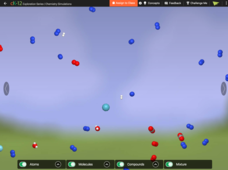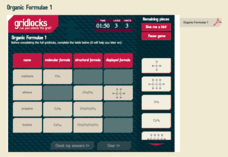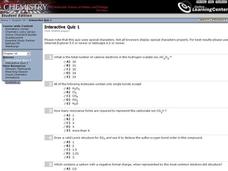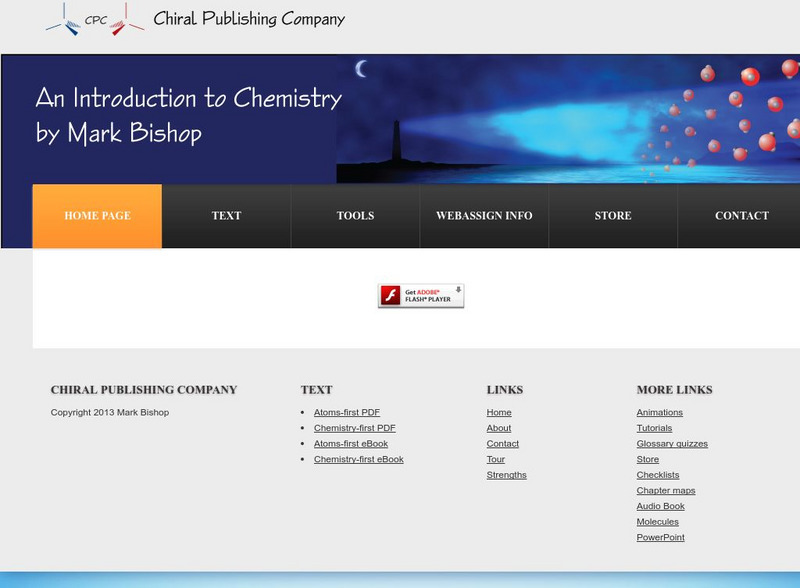Royal Society of Chemistry
Shapes of Molecules—Geometry of Central Atom
How is a molecule's shape determined? Explore bond angles, lone pairs, and VSEPR theory through a logic-based activity. Chemists pull together information about the major molecular shapes, then use it to solve puzzles.
Howard Hughes Medical Institute
Small-Molecule Diversity
One way to study the microscopic is to make it macroscopic. Each slide of the lesson presentation presents a different molecular model along with a brief description of the compound's function. Learners use the information to build...
Royal Society of Chemistry
Amines and Related Compounds
Scientists call a molecule that contains a nitrogen atom that behaves as a base an amine. Four puzzles, related to amines and similar compounds, challenge scholars to prove their knowledge. After passing each puzzle, the next increases...
CK-12 Foundation
Air Matters
What makes up the air we breathe? Young scientists explore the atoms and molecules in the air. An interactive lesson allows individuals to watch the movement of the particles in the air and change the makeup from a mixture to a...
Royal Society of Chemistry
Organic Formulae 1
Puzzles are the formula for success in organic chemistry! Hydrocarbons abound in the first of two interactives involving basic organic molecules. The easy-to-use lesson is available online and in print form, so you can pick your delivery...
Royal Society of Chemistry
Shapes of Molecules—Distortion from the Pure Geometry
Ready to introduce the realities of molecular geometry to chemistry pupils? Use a logic-based interactive! Perfect as individual practice, the puzzles explore the bond angles and repulsions present in three common molecular shapes.
Concord Consortium
Electron Geometry
It's time to whip your chemistry class into shape! Begin your study of molecular geometry with a colorful, 3-D interactive. The resource shows models of linear, trigonal planar, and tetrahedral molecules.
Royal Society of Chemistry
Organic Formulae 2
Is your chemistry class frustrated by the multitude of representations of organic molecules? Add some challenging puzzles to an otherwise ho-hum organic lesson and let the fun begin! The second of a two-part activity focused on basic...
Royal Society of Chemistry
Organic Names—Functional Groups
Worried that your lesson plan about functional groups is dysfunctional? Liven things up with interactive puzzles! Curious chemists arrange functional groups based on name, formula, suffix, and an example. The challenge begins when the...
Royal Society of Chemistry
Isomers of (E)-but-2-ene
One chemical formula—but how many different structures? Familiarize young chemists with the concept of isomers through simple, related games. Users identify each isomer base upon its name, structure, and type of isomerization in a set of...
Royal Society of Chemistry
Naming Esters
Do your chemistry scholars know their esters? Introduce the class to the nomenclature and structural formulas of common esters through thought-provoking games. Individuals or pairs of pupils match the name with the formula before using...
Learning Games Lab
Nitrogen in Pollutants
Responsible farming is important for maintaining natural resources. Eager scientists complete a WebQuest to explore what happens to nitrogen when it enters the soil. They learn about the chemical makeup of nitrogen-based molecules...
Scholastic
Study Jams! Atoms: Protons, Neutrons, Electrons
What's smaller than a kiwi seed? Atoms! Basic atomic structure is detailed for beginning chemists in a light-hearted animation. Protons and neutrons are explained as part of the nucleus, and so are electrons that encircle the nucleus....
Curated OER
Chemistry and Bonding
In this bonding worksheet, students take an interactive quiz with 15 multiple choice questions about the VSEPR Theory, bonding, the geometry of molecules, Lewis structures, resonance structures and enthalpy changes.
Chemistry Collective
Osmotic Pressure: Spontaneous Balloon Popping
Visualize osmosis using an interactive activity. As learners monitor a simulation, they witness the particle movement through the membrane. A balloon represents the cellular membrane and 'pops' as osmosis creates an imbalance of...
Curated OER
Ten Multiple-Choice Rate, Ratio, and Proportion Problems
In this rate, ratio, and proportion worksheet, 7th graders solve ten multiple-choice problems. The solutions are provided by clicking on the "show answers" on the bottom of the page.
University of Alberta
The University of Alberta: Detective O Chem
It has been discovered that an indigenous Australian plant possesses a compound that shows antiviral activity against the H5N1 virus. Your mission, should you accept it, is to identify the compound before a rival pharmaceutical company...
CK-12 Foundation
Ck 12: Chemistry Simulation: Air Matters
[Free Registration/Login Required] Explore the composition of air and learn about the different atoms and molecules that we breathe every day.
Chiral Publishing
Chiral Publishing: An Introduction to Chemistry: Types of Substances
Practice classifying substances using this fun, interactive exercise. Get either the formulas or names of substances, and decide which type of compound it is.
Wisc-Online
Wisc Online: Balancing Chemical Equations
Match the balanced chemical equations with the appropriate compound abbreviations.
Chiral Publishing
Chiral Publishing: An Introduction to Chemistry: Molecular Structures: Olestra
View a 3-D model of olestra, and compare it to a similar structure of a triglyceride. Also see the molecules that make up olestra. All compounds can be manipulated and studied from every angle.
Other popular searches
- Molecules and Compounds
- Compounds and Molecules Labs
- Chemical Compounds Molecules
- Elements Molecules Compounds



















